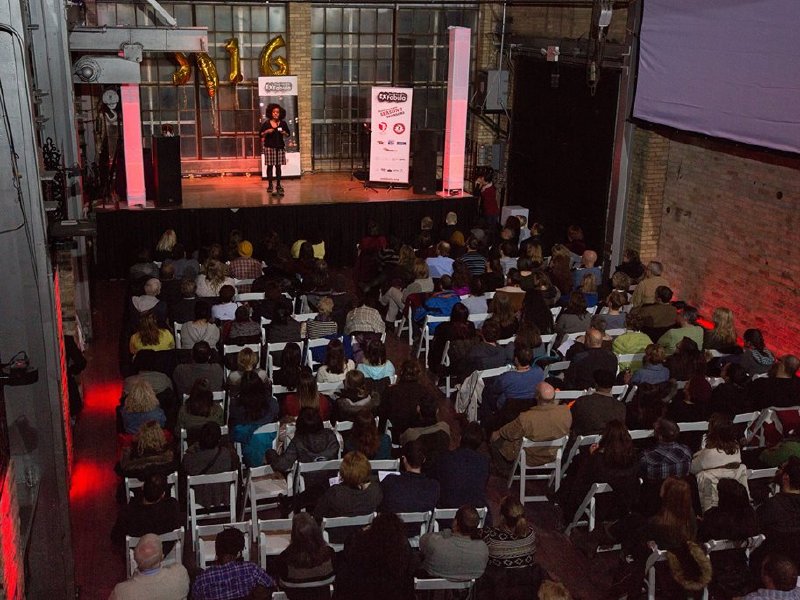We're all connected 24/7 to computers, tablets, phones and television. But there's more to life than being online – even for a digital media company – so this week we're excited to show you ways to connect with family and friends, even when there's no signal. Steinhafels presents OnMilwaukee Unplugged Week, a celebration of all things analog. Sit back, log into these stories and then log into the real world.
She postulates that sentimentality is really the only reason to keep print cookbooks around. And despite her admittance that she, too, falls prey to the joy that print cookbooks bring, she claims to be "OK" with their demise.
"In the future," she writes, "Cookbooks will be quirky art objects in the same sense that typewriters are today."
And she may be right. But, in the meantime, I shall choose to scoff at her ramblings.
Although I am an avid user of both print and digital media, I think that – even in the future – there will be room for both. Assuming that cookbooks are primarily vehicles for transmitting information and should be judged solely on that criteria, is a chief mistake in Anderson’s argument.
As one commenter on the Slate post writes, "A cookbook is not merely serving my efficiency and the need to get food on the table tonight. A cookbook offers escapism, inspiration, and, quite frankly, a tangible aesthetic experience not too far off from the tangible aesthetic experience of eating ... Yes, it is sentimental to appreciate the notes my mother wrote in her cookbook, but it is not ‘nonsensical’ to think this way."
Hear, hear! I raise my glass to you, wise woman.
The idea of books (generally) and cookbooks (more specifically) going extinct, is not something that makes me comfortable. Not at all.
My cookbook collection, which has grown exponentially over the years, currently tops out at well over 250 (Cookbook addict? Me? Nope, I can give them up anytime I want. My cookbook habit doesn’t control me, I control it… and so on). And, although I’ve managed to part with a variety of other tomes over the years, the collection is still growing. And there’s good reason for that.
I relish the time spent on a lazy weekend paging through cookbooks, salivating over delectable food photography and dog-earing recipes I can’t wait to try. I appreciate the time away from the incessant chatter of modern technology and the ability to sit back, relax and plan my menus for the week. So, the idea that physical cookbooks are just going to disappear is simply news too difficult to take.
I realize I sound like an old codger when I explain to folks how I relish the tactile nature of books -- their heft, smoothness and the delicate sheen of their pages. I probably sound even more nuts to some when I go further and explain that even the smell of books – which range from musty to inky and irresistably bookish – is an experiential joy. But it’s part, I would argue, of what will help them to endure.
Nonetheless, I’ve heard many arguments to the contrary; and it is here that I shall debunk them, one by one.
It’s more efficient. After all, you have all the recipes you need at the touch of a button
Yes, there’s efficiency in that. But, there are also logistical barriers to using electronics in the kitchen. If you’re an avid cook or baker, you’ll probably agree it’s pretty difficult to scroll and turn pages while cooking without getting flour and schmutz on your reader, unless you’re unusually pristine (a word I’d never use to describe myself). You could say that the same is true for cookbooks – though I like to think that the occasional stain, much like beloved marginalia – makes most cookbooks look and feel a bit more well loved. Plus, I can make notes right on the page about changes I’ve made to a given recipe (which, trust me, is an almost inevitable occurrence).
With an e-cookbook, you can just click the referring recipe and it'll come up on your reader, instead of flipping through the pages looking for it
Convenient, yes. But, I’m not convinced that convenience is the be-all, end-all of things. Just think of all the exercise you’re getting flipping through the pages of that 10 pound cookbook … or fetching another book from the shelf for reference … or, heaven forbid, walking up or down stairs to fetch one? And what about all the other recipes you get to glance at along the way? There are benefits to the intuitive navigation of text that allow you to stumble upon delightful things you may never have seen if you just click to the right place in one fell swoop.
Some online recipes and cookbooks integrate video
Sorry, guys. But, I don’t cook to video. I might sit on my couch and watch cooking shows as entertainment. But, I don’t need someone to walk me through every step of a recipe – unless there is a particularly intricate technique I need to learn. And, in most cases when there is, the videographer does a craptastic job of actually showing how to do it, or allowing enough time for the viewer to actually complete each step in an actual kitchen.
Many include shopping lists which can be transferred directly to your phone
Tell me about it. As an avid cook with a plentiful pantry, I don’t relish going through these silly shopping lists weeding out all the ingredients I already have. Nor do I appreciate how many of these shopping lists try to sell me on "brands" that I should buy. For me, they’re simply irritating.
And finally, the argument that is – supposedly – going to win me over with its no nonsense practicality:
E-books are cheaper
Some of them are. But, only some. In fact, a large number of e-cookbooks are just as expensive as their beloved paper counterparts. And, as I’ve illustrated, even if they're more affordable, that doesn’t necessarily make them better.
As a passionate champion of the local dining scene, Lori has reimagined the restaurant critic's role into that of a trusted dining concierge, guiding food lovers to delightful culinary discoveries and memorable experiences.
Lori is an avid cook whose accrual of condiments and spices is rivaled only by her cookbook collection. Her passion for the culinary industry was birthed while balancing A&W root beer mugs as a teenage carhop, fed by insatiable curiosity and fueled by the people whose stories entwine with every dish. Lori is the author of two books: the "Wisconsin Field to Fork" cookbook and "Milwaukee Food". Her work has garnered journalism awards from entities including the Milwaukee Press Club. In 2024, Lori was honored with a "Top 20 Women in Hospitality to Watch" award by the Wisconsin Restaurant Association.
When she’s not eating, photographing food, writing or planning for TV and radio spots, you’ll find Lori seeking out adventures with her husband Paul, traveling, cooking, reading, learning, snuggling with her cats and looking for ways to make a difference.







